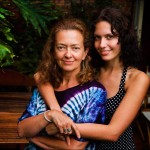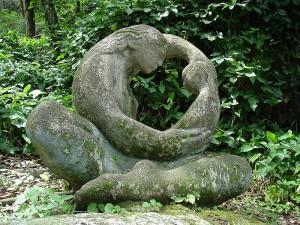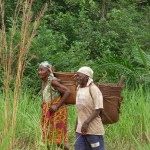I was very pregnant and very happy. I lived in Rome, Italy, and I wanted a home birth.
I wanted music, soft light, friends, baby on my [...]]]>

Safe motherhood for all. By F. Beaumont.
My daughter Esmeralda turns 18 today. Like all parents, I am amazed at how time flies. Like all mothers, I get reminiscent about those days, 18 years ago.
I was very pregnant and very happy. I lived in Rome, Italy, and I wanted a home birth.
I wanted music, soft light, friends, baby on my stomach still attached by umbilical cord, no drugs, and no epidural. A birth by my own rules, not by a cold hospital’s.
I found a group specialized in home births – Il Melograno. Their package included ob-gyn and midwife, courses, support and, more importantly, a woman-friendly feel. A photographer from Marie Claire magazine would do a photo reportage on my happy home birth.
Our premise: pregnancy is neither a disease nor a disability. Pregnancy and birth have become over-medicalized; women should reclaim it from doctors overly fond of control and caesareans. My family, my colleagues and the baby’s father thought I was crazy. Home births are more common now but women still battle to extricate pregnancy and birth out of the hospital realm.
In Brazil, we recently lost a battle for a centre for natural birth in Rio de Janeiro.
Clueless mommy
In my case, at midnight, after 30 hours of labour, I was stuck at 6 cms dilatation – and exhausted. A home birth must be 100 percent natural, so the few drops of oxitocyn to trigger full dilation had to be administered in hospital, three blocks away. There I went. At 2am my daughter was born – and promptly taken away to the nursery.
At 5:30am a nurse literally dumped my baby girl in my arms and left. No instructions on how to feed, nothing. My midwife and friends were coming at 8 am. What to do? I had never been around a newborn. I was like Carrie Bradshaw in Season 2 of Sex and The City – domesticity and motherhood were not part of my landscape.
So there I was, baby on one hand, baby book on the other, trying to figure it out. This is the most ridiculous and pathetic image of modern motherhood, I thought. How did we end here, from birth as a group event to 6 AM loneliness in hospital?
Less than 24 hours later, against hospital rules, I signed waivers absolving doctors of any responsibility and checked myself out.
I went home and turned on the CD player. My daughter’s godmother had been listening to the Rolling Stones: “You can’t always get what you want”. I chuckled.
Two close friends, one in Windhoek and one in London, recently tried a home birth but ended in hospital, just like me. Still, we were happy to go through labour at home.
Meanwhile, many women struggle to have a safe birth – anywhere. About half a million women die in childbirth very year. There are not enough trained midwives to ensure a safe labour, whether at home or at a clinic,

Art by Nelly Romeo Alves, photo by E. Zimbres
At a conference on reproductive health in Berlin last week, the World Health Organisation reported that one woman dies every minute for lack of adequate pregnancy and birth services.
A cruel paradox: the world proffers to revere motherhood but does not make it safe and comfortable for mothers to give birth.
]]>“It smells strongly of wine gone vinegary but it works ,” he says.
Last year, [...]]]>
“It smells strongly of wine gone vinegary but it works ,” he says.

The forest is their pharmacy. Photo: M. Sayagues
Last year, when he was scratching madly with chickenpox, his granny’s ointment of coconut oil and leaves relieved the itchiness.
When his friend Geane Castro feels a cold coming, his grandmother makes him a hot bath with water infused with leaves and bark, then a special tea with plants she gathers in the forest. Presto, he recovers.
I meet them at Teia D’Arte, an art gallery in Sao Tome, the capital of the tiny two-island nation of Sao Tome and Principe, off the coast of Gabon.
With a rich biodiversity of 600 botanical species and 132 endemic plants, the islands’ rainforest is a well-stocked pharmacy for herbalists.
Their knowledge is captured in a decade-long ethno-pharmacological study published last year. Researchers worked with 40 traditional healers, midwives and grandmothers to identify and classify 325 medicinal plants, note 1,000 recipes and test 25 plants in the lab. Many look promising for developing new medicines.
Generations of expertise
Across Africa, healers hold an impressive knowledge of medicinal plants, accumulated through generations and transmitted through years of apprenticeship.
The new generation of healers blends tradition with modernity. They throw the bones, brew herbal medicines, book patients by cellphone and negotiate the complexities of modern life. They follow tradition and break away from it.
Nkunzi Zandile Nkabinde is a young Zulu sangoma – the word for traditional healer in South Africa.  She works in Soweto, married her partner in June, and wrote a book about her life in an homophobic society: Black Bull, Ancestors and Me: My Life as a Lesbian Sangoma.
She works in Soweto, married her partner in June, and wrote a book about her life in an homophobic society: Black Bull, Ancestors and Me: My Life as a Lesbian Sangoma.
Today, 31 August, is the African Traditional Medicine Day, established in 2001 by the World Health Organisation.
Repressed by colonial authorities, condemned as witchcraft by churches, spurned by post-colonial Marxist governments, African traditional medicine is regaining prestige.
The WHO describes it as “heritage, knowledge and healing that is affordable, accessible, and culturally acceptable”.
For a majority of Africans, especially rural, traditional medicine is the main professional health care, sometimes the only one available,or the cheapest and closest. In the cities, many people will consult both a bio-medical doctor and a traditional healer.
In Africa, to cure is to restore human vitality and harmony with the universe. Body and soul are not separate entities; they are linked to nature, spirits and other people.
The timeless wisdom of healers is an essential part of African health. “It would be sad to lose this knowledge,” says Sousa.
]]>